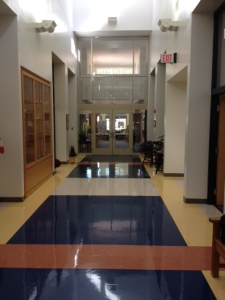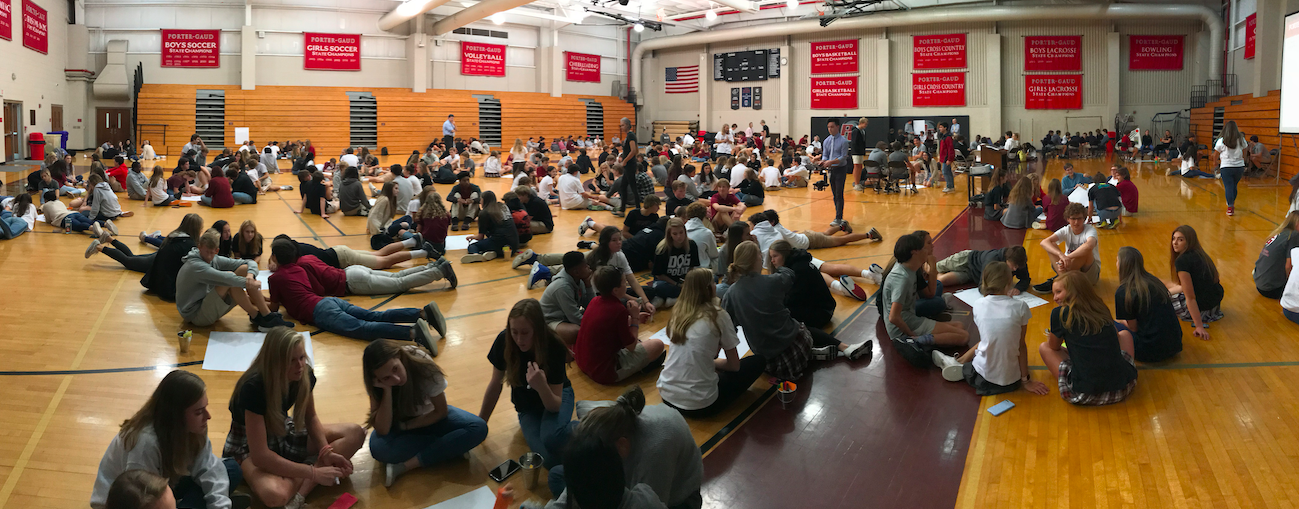As I have mentioned before, some organizations innovate because they want to and some because they have to, and some a combination of both. I spent the afternoon at The Collegiate School in Richmond and confirmed what I have suspected for some time: my friends Head Keith Evans and Academic Dean David Colon and their team are setting important examples for schools that choose to innovate. This is a highly respected independent school with strong admissions demand, and they could probably sit on their heels. But Keith and David are both powerful and intelligent leaders who know not only the right thing to do, but also how to do it. This post will focus on general approaches to innovation, as well as three unique programs Collegiate has built in civic engagement, student global leadership, and management leader training. It is a little long because there is a lot of meat here that any school can learn from. Interested? Read on!
 Collegiate is a large K-12 with more than 1,600 students. I was able to meet with two groups of faculty and staff, and one large, fired up student group (more on them later). I asked first what innovation means to the adults at Collegiate.
Collegiate is a large K-12 with more than 1,600 students. I was able to meet with two groups of faculty and staff, and one large, fired up student group (more on them later). I asked first what innovation means to the adults at Collegiate.
“Innovation is about fortitude: to look at what you are doing and ask ‘is it working? Why isn’t it working? Where do we want to go? How can we get there?’ and to do this without defaulting to buying something off the shelf. Innovation is not about buying into a system; it is about developing a system, about having the right to ask questions and play with things”. In 2007, Keith issued his “Head’s Challenge”, asking for volunteers from the faculty to group together and learn about what was possible in education. One group went out and visited schools with strong reputations but that had different mindsets from Collegiate’s. Another did deep reading. The third engaged with the Da Vince Center at VCU for a semester to learn about design thinking. Members of this final group felt it was a tipping point for them in that the experience validated their sense of how learning should take place. They started looking for ways to leverage the “talent in the room” and realized the powerful resources they had at the school.
Just about everyone I spoke with cited a common thread to their ability to move significantly to a new set of educational goals: the steady and consistent communication and leadership that Keith brings to the equation. By sending the faculty out, and bringing new ideas to the school, they say there is general agreement amongst the faculty that learning should go more deeply into fewer things, increase time spent on thinking, and that trying and failing is OK. There is a constant communication to the parents about evolving trends in education from around the country. Does everyone on staff “get it”? “They should; it is being expressed constantly, at every meeting, in every communication. If they don’t, they are not listening.”
Here are some of the examples they offered:
After years of disgruntled feedback from parents about Lower School math, faculty visited many schools and came back with the opinion that the math program was just fine but that there were many unfounded myths and confusion about it amongst the parents. They put on a full court press, showed how they were tailoring lessons to student needs, and successfully busted the myths. They adjusted some of the implementation to “get away from solving 20 problems a day and another 20 for homework. Now students are working together to solve more complex problems.” Before the 4th grade went on a visit to the state capitol, groups studied 18th Century architecture, and designed and built simple models of what they would see on their trip, which involved a LOT of math. In the last few years they have opened a math drop-in time for grades 2-4 for 20 minutes before school starts.
 Collegiate has a senior seminar that I have shared about in the past. For anyone looking for a truly authentic senior capstone project (or, frankly, one that could be adapted for an 8th grade capstone), I would really recommend getting in touch with Collegiate for more information. A few years ago it was largely a required semester of government and ethics, not one of the more popular courses on campus. They took a hard look and re-tooled. Now the students select from a range of topics, all of which address issues of civic engagement in ways that allow the exhibition of passion for both students and teachers. The subject list is too extensive to relay here, but I would compare it to the best of freshmen seminars I have seen offered at many top universities. They overtly teach the skills of discourse, something that is a vanishing part of our increasing uncivil and media-drenched society. Now students frequently extend their classroom discussions into the lunchroom and there is real energy about the lasting impact of the course.
Collegiate has a senior seminar that I have shared about in the past. For anyone looking for a truly authentic senior capstone project (or, frankly, one that could be adapted for an 8th grade capstone), I would really recommend getting in touch with Collegiate for more information. A few years ago it was largely a required semester of government and ethics, not one of the more popular courses on campus. They took a hard look and re-tooled. Now the students select from a range of topics, all of which address issues of civic engagement in ways that allow the exhibition of passion for both students and teachers. The subject list is too extensive to relay here, but I would compare it to the best of freshmen seminars I have seen offered at many top universities. They overtly teach the skills of discourse, something that is a vanishing part of our increasing uncivil and media-drenched society. Now students frequently extend their classroom discussions into the lunchroom and there is real energy about the lasting impact of the course.
I spent an hour with a group of extraordinary students representing the second annual class to organize and participate in the Collegiate International Emerging Leaders Conference. I heard a presentation on this program last year; I know something about global programs having helped found the one at Parker, and this conference is taking global engagement to a completely new and important level. 40 students from 11 countries spent 10 days at Collegiate, grouping with 16 Collegiate seniors. Each team of roughly four students from a foreign country brings with them a complex environmental problem and presents it to the whole group. The students break into teams and spend the two weeks researching and designing solutions to the problems they have selected. Along the way community, university, and corporate business and research leaders mentor them in methods of design thinking and problem solving. This year the teams tackled issues like rhino poaching, debris from the space program in Khazakstan, deforestation in Malaysia, and chemical pollution on pineapple crops in Costa Rica. At the end, the teams make presentations to an internal and external audience.
 As you can imagine, the long-term impacts of a program like this go way beyond problem solving; the students all told me they know they are not going to solve the problems and they also know that is not the point. “It was about a collaborative process and learning to work with people with different viewpoints. At first we were pretty shy, but we quickly started working and learning together.” “After the conference I had to make a presentation in one of my science classes and, whereas before I would have been nervous and uncertain, now I know it is not a big deal.” As you can also imagine, these students are now all connected via social media and planning when and how they can re-engage. There were many tears at the leaving, and the Collegiate students are bonded around these lessons of empowerment in tangible ways. As one student put it, “We missed 10 days of regular class for this, but I learned way more than I ever could have in class in those 10 days.” Since hearing of this program last year I think it is highly replicable (time consuming, yes) and others might want to reach out to Collegiate and get more information. Here are several links to both student blogs and official information on the conference, or contact Clare Sisisky, director of the program. Thanks to the students who came in to talk with me about it ON THEIR DAY OFF!
As you can imagine, the long-term impacts of a program like this go way beyond problem solving; the students all told me they know they are not going to solve the problems and they also know that is not the point. “It was about a collaborative process and learning to work with people with different viewpoints. At first we were pretty shy, but we quickly started working and learning together.” “After the conference I had to make a presentation in one of my science classes and, whereas before I would have been nervous and uncertain, now I know it is not a big deal.” As you can also imagine, these students are now all connected via social media and planning when and how they can re-engage. There were many tears at the leaving, and the Collegiate students are bonded around these lessons of empowerment in tangible ways. As one student put it, “We missed 10 days of regular class for this, but I learned way more than I ever could have in class in those 10 days.” Since hearing of this program last year I think it is highly replicable (time consuming, yes) and others might want to reach out to Collegiate and get more information. Here are several links to both student blogs and official information on the conference, or contact Clare Sisisky, director of the program. Thanks to the students who came in to talk with me about it ON THEIR DAY OFF!
One more unique and important way that Collegiate is moving intentionally toward a more nimble, innovative, and forward-thinking posture. Two years ago, Keith asked the University of Richmond Business School to develop and deliver a tailored leadership course for Collegiate middle managers. They have now sent about 30 of their employees through in two semester-long sessions to learn about and practice the principles of decision-making, strategic thinking, and project management. Each employee chose a project that they wanted to tackle, and learned the skill set by developing and presenting an action plan viewed through the lens of the course. The folks I met with say they learned specific skills in understanding personal strengths and weaknesses, creating good arguments, team building, overcoming obstacles, and developing buy-in. (I had to smile; they darn near started reciting language from my book, The Falconer; I guess I could teach at a Bus School!)
There were additional large benefits to the course. It went a long way to busting the silos they worked in, as they went off campus for three-hour blocks to work and learn together. They learned they had lots more in common than they thought, and now they have a shared language in which to engage their work at school and their interests beyond. They produced highly relevant work, improved internal communication, and now say they have a much better understanding of the complexity of the school. Keith has told me in the past that he feels there is a lack of leadership training appropriate to independent school management, and he deserves huge credit for taking this risk of associating with a business school. It has really paid off and I think it is completely exportable to any other school that is in range of a reputable local university.
 One more note: Collegiate is in the process of building a marvelous new Commons building that will be an open, flexible space for library, meeting, learning, design, and a visible play/skunkworks space. Over the past few years they have focused on how indoor and outdoor spaces can work together for enhanced learning, and how the classroom of yesterday is just not what is needed today and in the future. I look forward to seeing the new Commons and begged them to make all of the walls writable surfaces!
One more note: Collegiate is in the process of building a marvelous new Commons building that will be an open, flexible space for library, meeting, learning, design, and a visible play/skunkworks space. Over the past few years they have focused on how indoor and outdoor spaces can work together for enhanced learning, and how the classroom of yesterday is just not what is needed today and in the future. I look forward to seeing the new Commons and begged them to make all of the walls writable surfaces!
Collegiate has taken a patient but highly intentional approach to shifting how and what they teach. It took two years to “get people a picture of what is possible”, and they are about five years into the process of true evolutionary change. David thinks it may be another 3-5 years before they are at a level of true self-evolution. They have a decentralized management system, which is key to creativity, and in Keith they have a master communicator to the parents and faculty. I want to end by wrapping this back to the opening paragraph. Collegiate is changing how and what they teach because they know it is the right thing to do. This takes more courage than innovating out of necessity. They make a lot of small bets and a few big ones, and tweak where needed. They have obstacles: the University of Virginia likes to see those AP’s on student transcripts, which stymies innovation at the Upper School level. They still have a daily schedule that does not allow some of what they want to do. But those will come. Yes, Collegiate has some resources that other schools do not, but some of these programs can be reproduced at a reasonable cost, and they have huge impact, not only for students today, but for our organizations in the future.
P.S. One more thing if you got this far. A year+ ago Keith sent me a list of five ways we could measure schools; I added five more and he used it at a conference. Here is a link to the list. They still crack me up, both because they are funny/quirky but also because they would be darn useful. I can’t recall which are his and which are mine, but maybe they would be good fodder for your next board meeting!





Leave A Comment